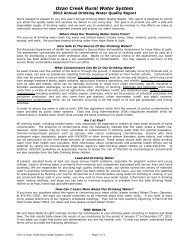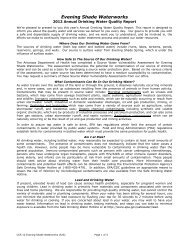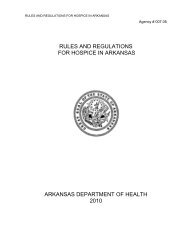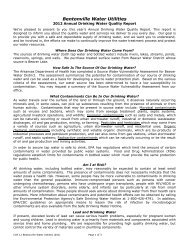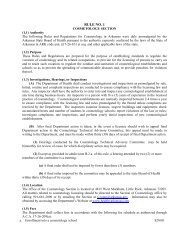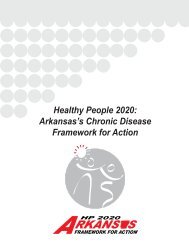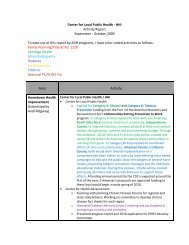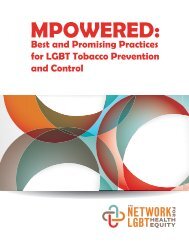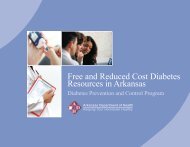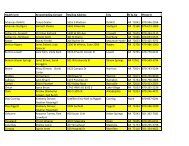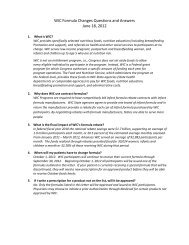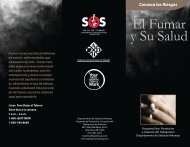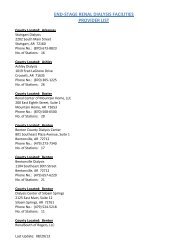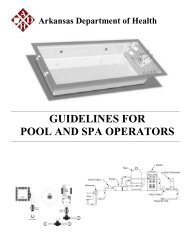Press Release - Arkansas Department of Health
Press Release - Arkansas Department of Health
Press Release - Arkansas Department of Health
Create successful ePaper yourself
Turn your PDF publications into a flip-book with our unique Google optimized e-Paper software.
FOR IMMEDIATE RELEASE<br />
July 21, 2003<br />
Beat the Heat:<br />
<strong>Health</strong> <strong>Department</strong> Offers Heat Survival Tips<br />
(Little Rock--) As the mercury continues to rise, <strong>Arkansas</strong> <strong>Department</strong> <strong>of</strong> <strong>Health</strong> <strong>of</strong>ficials are warning<br />
residents that heat can kill, but using precautionary measures can save lives.<br />
On average, there are 400 heat-related deaths a year in the U.S. The 1995 heat wave in the Midwest<br />
contributed to 716 heat-related deaths in the U.S. that year alone. The heat wave <strong>of</strong> 1980 was an<br />
especially hard one for <strong>Arkansas</strong>—153 heat-related deaths. Last year, seven Arkansans died from the<br />
extreme hot weather.<br />
Dr. David Bourne, Medical Leader, says, “While the elderly, people with health problems, and very young<br />
children are the most vulnerable, heat can affect anyone—even strong, healthy athletes. Our bodies are<br />
cooled primarily by losing heat through skin and evaporation <strong>of</strong> perspiration. Problems occur when we are<br />
unable to shed excess heat from too much sun or high humidity levels. When our heat gain exceeds the<br />
amount we can get rid <strong>of</strong>, our temperature begins to rise, and heat-related illness may develop.”<br />
The following heat disorders are progressive and should be attended to immediately.<br />
• Heat cramps. These are the result <strong>of</strong> prolonged muscular pain caused by severe salt depletion due<br />
to heavy sweating. Treatment includes salt replacement, cooling down and gentle massage.<br />
• Heat exhaustion. This is the most common illness caused by heat and <strong>of</strong>ten occurs while the person<br />
is working outside or attending outside events in extremely hot, humid weather. With heat<br />
exhaustion, there is interference in the circulation <strong>of</strong> blood to vital organs such as the brain, heart,<br />
and lungs. The victim may complain <strong>of</strong> weakness and feel faint. Other symptoms include<br />
dizziness, nausea, headache and confusion. The person should be moved to a cooler place, and wet<br />
cloths applied for cooling down. Fluid and salt should be replaced. Depending on the severity <strong>of</strong><br />
the illness, hospitalization and intravenous fluid replacement may be necessary. This condition<br />
usually comes just before heat stroke.<br />
-more-<br />
<strong>Press</strong> <strong>Release</strong><br />
www.healthyarkansas.com<br />
For more information, contact:<br />
Dr. David Bourne, Medical Leader, at (501)<br />
661-2168<br />
<strong>Arkansas</strong> <strong>Department</strong> <strong>of</strong> <strong>Health</strong>♦Keeping Your Hometown <strong>Health</strong>y<br />
4815 West Markham Street – Little Rock, <strong>Arkansas</strong> 72205-3867
<strong>Arkansas</strong> <strong>Department</strong> <strong>of</strong> <strong>Health</strong><br />
Beat the Heat<br />
Page 2<br />
• Heat stroke (also called sunstroke). This is a life-threatening condition in which the victim’s<br />
temperature-control system stops working. Sweating stops completely, and the body’s<br />
temperature can rise so high that the nervous system, the brain and other organs can be damaged<br />
permanently. Death may occur if the body is not cooled quickly. The symptoms <strong>of</strong> heat stroke<br />
include sudden high fever, dry skin, delirium, convulsions and seizures. Heat stroke is a medical<br />
emergency—call 911 and cool the person as fast as you can. Ice, a cold bath and wet sheets are<br />
recommended until medical help arrives.<br />
Those who work, exercise, or participate in strenuous activity, such as soccer or football practice, for an<br />
hour or more during intense heat, may lose or sweat up to two quarts <strong>of</strong> water. If you must pursue<br />
intense activity during hot weather, follow these safety tips.<br />
• Drink plenty <strong>of</strong> water; fluid replacement is crucial to avoid heat risks. Drink more water than<br />
usual before exercising or working in the heat. If you are elderly or taking medication, ask your<br />
doctor about fluid intake recommendations.<br />
• Schedule your strenuous activity during the coolest time <strong>of</strong> the day.<br />
• Monitor how you feel. If you have difficulty maintaining your regular pace, slow down.<br />
Elderly people should avoid staying shut-up indoors during heat waves without using air conditioning.<br />
More than half <strong>of</strong> the 700 heat-related deaths in the 1995 Chicago heat wave could have been prevented<br />
with an air conditioner in the home, according to a published study. Experts say fans are apparently not<br />
effective against heat illness during intense heat waves. If you cannot afford an air conditioner for your<br />
home, spend more time in other air-conditioned environments. Access to air conditioning for even a<br />
few hours a day is protective. If you know someone who may be at risk for heat-related problems,<br />
check on them frequently.<br />
By following these simple guidelines, Arkansans can beat the heat and stay healthy and safe during the<br />
hot, summer months.<br />
###<br />
<strong>Arkansas</strong> <strong>Department</strong> <strong>of</strong> <strong>Health</strong> ♦Keeping Your Hometown <strong>Health</strong>y<br />
4815 West Markham Street – Little Rock, <strong>Arkansas</strong> 72205-3867




